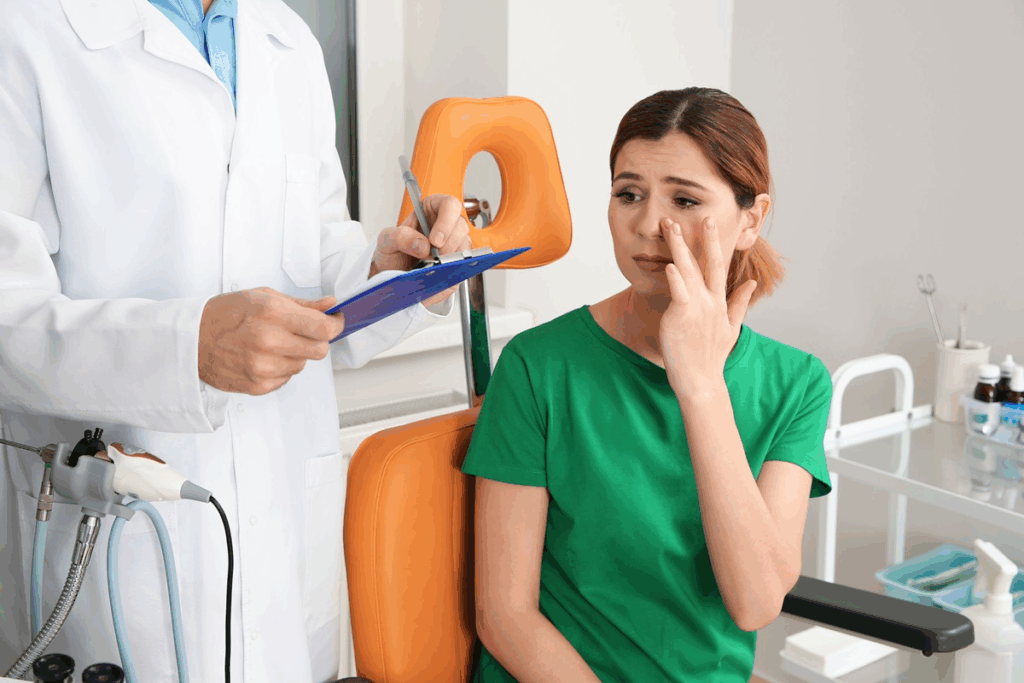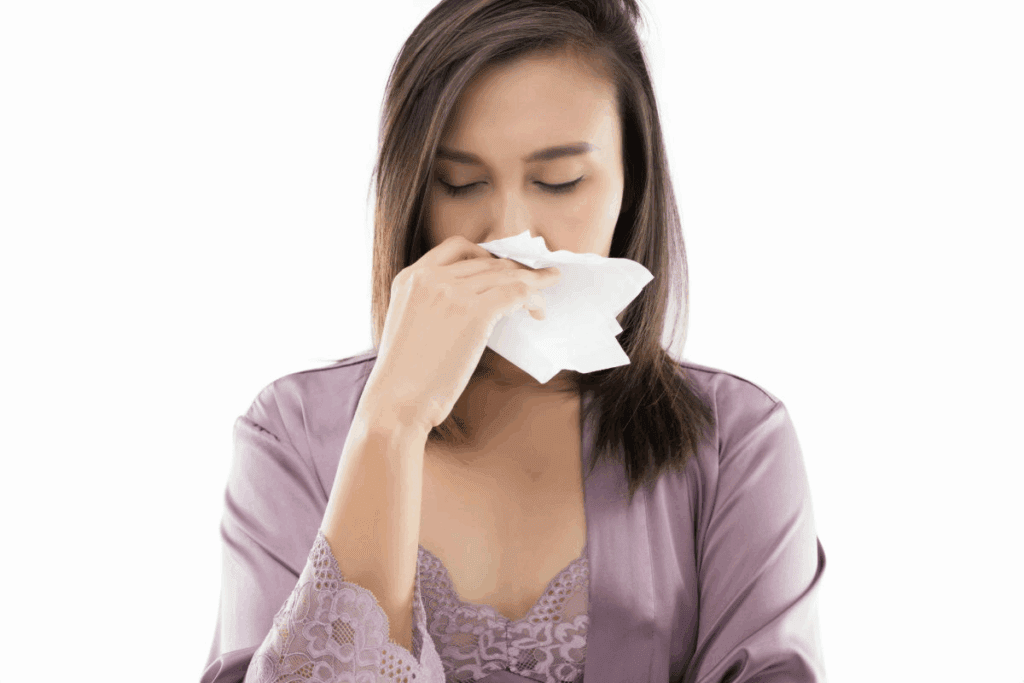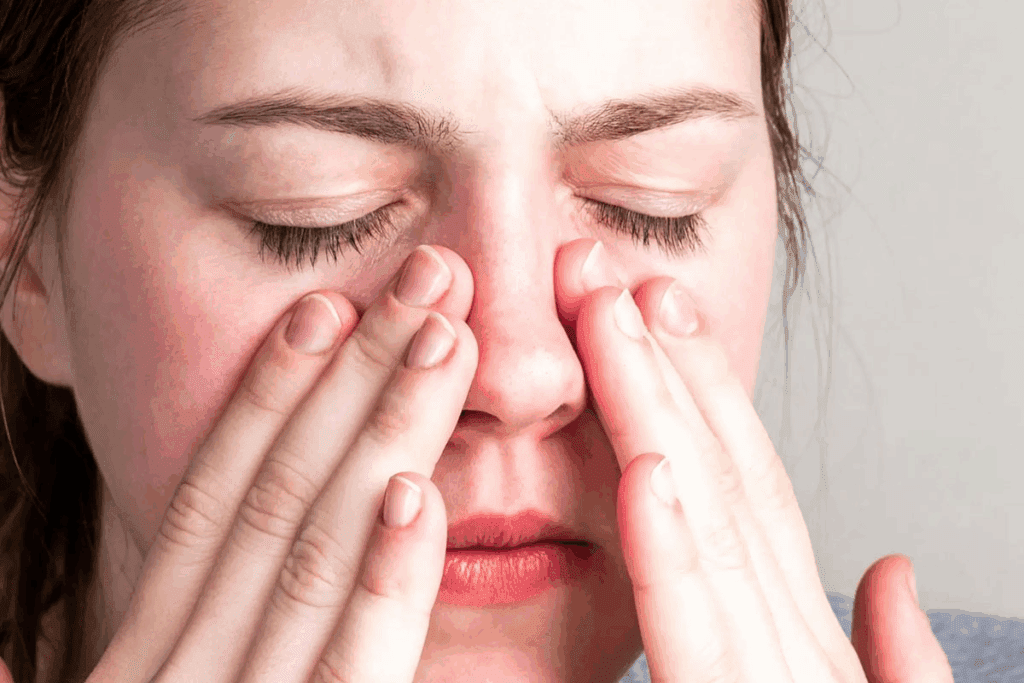Last Updated on October 31, 2025 by Saadet Demir

A complete guide to recurrent sinusitis, focusing on identifying and treating underlying factors like allergies or structural issues.
Having four or more sinus infections a year can really hurt your life quality. This problem, called recurrent sinusitis, affects millions. At Liv Hospital, we get how tough it is to deal with this and we’re here to help fully.
Recurrent sinusitis means having many sinus infections a year, but not always having symptoms. Sinusitis is a big health issue in the U.S., leading to many doctor visits. Our team uses the latest in diagnosis and treatment to care for you personally.

To tackle recurrent sinusitis, we must first understand it. It’s also known as rhinosinusitis. It causes inflammation in the sinuses and nasal cavity. This leads to uncomfortable symptoms and complications.
Rhinosinusitis is when the nasal passages and sinuses get inflamed for more than 12 weeks. It can also happen with a certain frequency. Symptoms include nasal congestion, facial pain, and thick nasal discharge. Doctors use imaging or endoscopy to confirm it.
This condition can really affect someone’s life. It can mess with daily activities, sleep, and overall health. Getting a correct diagnosis is key to managing and treating it.
Recurrent sinusitis is common worldwide. It costs nearly $2.4 billion annually in direct medical costs. This shows the big economic burden it puts on healthcare systems.
There are also indirect costs. These include lost productivity and reduced quality of life. These costs add to the overall economic impact.
Category | Cost | Impact |
Direct Medical Costs | $2.4 billion | Annual expenditure on sinusitis treatment |
Indirect Costs | Not Quantified | Includes lost productivity and reduced quality of life |
Total Economic Burden | Significant | Affects healthcare systems and individual well-being |
Rhinosinusitis can be classified into different types. Knowing these types helps determine the right treatment.
Each type needs a specific management plan. This helps alleviate symptoms and prevent further problems.

Recurrent sinusitis comes from many factors. These include the body’s shape, infections, and allergies. Knowing these causes helps in treating the condition well.
Body shape issues can lead to sinusitis. A deviated septum blocks the way fluids drain, making infections more likely. Small sinus openings also cause problems with drainage.
Bacteria, viruses, and fungi cause sinusitis. Chronic bacterial infections keep causing inflammation and infections over and over. Fungal infections can also be a problem, mainly for those with weak immune systems.
Allergies and the environment play big roles in sinusitis. Pollen, dust mites, and pet dander can start allergic reactions. Pollution and tobacco smoke make things worse.
Some health issues raise the risk of sinusitis. Gastroesophageal reflux disease (GERD) lets stomach acid get into the sinuses, causing inflammation. Conditions like cystic fibrosis and weak immune systems also increase the risk.
Knowing these causes helps doctors create better treatment plans for sinusitis.
It’s important for patients to know the signs of recurrent sinusitis to get the right treatment. This condition is marked by inflammation in the sinuses and nasal cavity.
The main symptoms include nasal congestion, facial pressure, and thick discharge. These happen because of sinus inflammation and infection. Nasal congestion makes breathing through the nose hard.
Facial pressure and pain are common, felt in the cheeks and forehead. Thick, yellow or green nasal discharge shows an infection.
Patients with recurrent sinusitis may also have secondary symptoms. These include headaches, fatigue, and bad breath (halitosis).
It’s key to tell recurrent sinusitis from other similar conditions. Allergies, the common cold, and migraines can look like sinusitis symptoms.
A main difference is the duration and frequency of symptoms. Sinusitis comes back often, while other conditions might not.
Knowing these differences helps doctors create the right treatment plan for each patient.
Diagnosing recurrent sinusitis is a detailed process. It starts with understanding the patient’s medical history and a thorough physical exam. This approach helps find the root cause and plan the best treatment.
The first step is to gather the patient’s medical history. This includes their symptoms, how long they’ve had them, and what makes them better or worse. A physical exam is also key. It looks for any physical issues or signs of infection.
Key components of the medical history include:
Imaging studies are very important in diagnosing recurrent sinusitis. The most used is the CT scan. It gives clear images of the sinuses and spots any problems or abnormalities.
Imaging Modality | Use in Recurrent Sinusitis Diagnosis |
CT Scan | Detailed imaging of sinuses, assessing disease extent and anatomical abnormalities |
MRI | Evaluating soft tissue involvement and complications |
Laboratory tests are key in diagnosing recurrent sinusitis. They help find infections or allergies. Common tests include:
“The diagnosis of recurrent sinusitis requires a thorough evaluation, including a detailed history, physical exam, and the right tests.” –
American Academy of Otolaryngology
In some cases, more specialized tests are needed. These include nasal endoscopy and tests to check how the sinuses work. These help doctors get a clear picture of the condition.
By using all these methods, doctors can accurately diagnose recurrent sinusitis. They can then create a treatment plan that works best for the patient.
There are many ways to treat recurrent sinusitis, and each plan is made just for you. We know that treating this condition well means using a mix of treatments.
Antibiotics are key in treating sinusitis, mainly when a bacterial infection is found. We pick antibiotics that can fight many kinds of bacteria.
The right antibiotic depends on your symptoms, health, and past treatments. Common choices are amoxicillin-clavulanate, doxycycline, and fluoroquinolones.
Corticosteroids are strong anti-inflammatory medicines. They help lessen nasal stuffiness and sinus pressure. We might give them as a spray or pill, based on how bad your symptoms are.
For ongoing treatment, we often use sprays like fluticasone and budesonide. They work well and don’t get into your system much.
Decongestants reduce swelling in your nose, making it easier to breathe. They’re good for quick relief during bad flare-ups.
Antihistamines help if you have allergies, which often go with sinusitis. They block histamine, easing symptoms like sneezing and itching.
Treatment | Primary Use | Examples |
Antibiotics | Bacterial infections | Amoxicillin-clavulanate, Doxycycline |
Corticosteroids | Inflammation reduction | Fluticasone, Budesonide |
Decongestants | Nasal congestion relief | Pseudoephedrine, Phenylephrine |
Antihistamines | Allergic symptom management | Loratadine, Cetirizine |
If allergies are making your sinusitis worse, immunotherapy might help. It involves slowly getting used to small amounts of the allergen.
This treatment can be shots or sublingual therapy. It’s a long-term effort but can greatly lessen symptoms over time.
By knowing all the treatment options, we can create a plan that fits your needs for recurrent sinusitis.
When medical treatments don’t work, surgery might be needed for recurrent sinusitis. Surgery is considered when sinusitis greatly affects a person’s life and other treatments have failed.
FESS is a less invasive surgery that uses an endoscope to see inside the sinuses. It removes blockages or abnormalities. This method is precise and causes less damage, leading to quicker healing. FESS is great for chronic sinusitis as it helps with drainage and lowers infection chances.
Balloon sinuplasty is a minimally invasive procedure for recurrent sinusitis. It uses a balloon to widen the sinus passages, improving drainage. This method is less invasive than traditional surgery and can be done with FESS. It’s known for quick recovery and effectiveness in reducing sinus pressure and congestion.
Septoplasty and turbinate reduction fix anatomical issues that cause sinusitis. Septoplasty fixes a deviated septum, and turbinate reduction makes turbinate bones smaller. These surgeries help with breathing and drainage, lowering sinus infection chances.
Proper care is key after surgery for recurrent sinusitis. This includes nasal saline irrigations, avoiding hard activities, and following the surgeon’s advice. Following these steps can greatly improve surgery results and lower complication risks.
Choosing surgery is a big decision. Our team is dedicated to giving full care and support during surgery. We aim to ensure patients get the best results.
Home remedies and self-care are key in fighting off recurrent sinusitis. By adding these to your daily life, you can feel better and live better.
Nasal irrigation is a simple yet effective way to clear your sinuses. Use a saline solution, made by mixing salt and water. Rinsing your nasal passages regularly can help reduce congestion and promote drainage.
To do nasal irrigation, you can use a neti pot or a squeeze bottle with a nasal spray tip. Make sure to use sterile or distilled water to avoid infection. Always follow the manufacturer’s instructions for the device you’re using.
Steam inhalation is another great way to loosen mucus and reduce sinus pressure. You can inhale steam from a bowl of hot water or use a steam humidifier. Adding eucalyptus oil or menthol to the water can enhance the benefits by helping to open up your airways.
Keeping your environment humid, which is important in dry climates or winter, can prevent sinus dryness and irritation. We suggest using a humidifier in your home, specially in your bedroom while you sleep.
Method | Description | Benefits |
Nasal Irrigation | Rinsing nasal passages with saline solution | Reduces congestion, promotes drainage |
Steam Inhalation | Inhaling steam to loosen mucus | Relieves sinus pressure, opens airways |
Humidification | Maintaining a humid environment | Prevents sinus dryness, reduces irritation |
Making dietary changes can help manage recurrent sinusitis. Increasing your intake of fruits, vegetables, and whole grains can provide essential nutrients and antioxidants that support immune function.
Avoiding foods that can trigger or worsen sinusitis, such as dairy products or spicy foods, may also be beneficial. Keeping a food diary can help you identify any specific triggers.
Stress can make sinusitis symptoms worse. Practicing stress management techniques such as meditation, yoga, or deep breathing exercises can help alleviate stress and promote overall well-being.
By incorporating these home remedies and self-care strategies into your daily routine, you can better manage recurrent sinusitis and improve your quality of life.
We look into how alternative and complementary therapies help with recurrent sinusitis. These methods can offer extra relief for some people. They work alongside traditional treatments.
Herbal remedies might help with sinusitis symptoms. Andrographis paniculata and Echinacea could reduce sinus pressure and congestion. But, always talk to a doctor before trying herbal supplements.
Acupuncture is part of Traditional Chinese Medicine. It involves thin needles in specific body points. Some studies show it can lessen sinusitis by improving nasal flow and reducing swelling.
Essential oils like eucalyptus, peppermint, and tea tree oil are used in aromatherapy. They can be inhaled or used in a diffuser. People find they help with sinus congestion. But, use them carefully because they are strong.
Vitamins and minerals can boost your immune system and fight off sinus infections. Vitamin C and zinc are good for your immune health. Getting enough of these through food or supplements can help your sinuses.
In summary, while these therapies shouldn’t replace traditional treatments, they can be helpful. Adding them to your treatment plan might give you more relief and improve your life quality.
To stop sinusitis from coming back, we need to tackle it from many angles. This includes changing our environment, our lifestyle, and using medicine. Knowing what causes sinusitis and acting early can help lessen its impact.
One big step is to control our surroundings. This means avoiding things that can trigger sinusitis. Here’s how:
Changing how we live can also help a lot. For example:
Eating right is also important for our sinuses. Foods full of fruits, veggies, and whole grains help our immune system.
Sometimes, we need medicine to stop sinusitis from happening again. This might include:
Medication | Purpose | Benefits |
Nasal Corticosteroids | Reduce nasal inflammation | Decreases congestion and sinus pressure |
Antibiotics | Treat bacterial infections | Reduces risk of bacterial sinusitis |
Immunotherapy | Desensitize against allergens | Reduces allergic reactions |
Keeping our immune system strong is key to avoiding sinusitis. We can do this by:
Always talk to a doctor before trying new supplements or medicines. They can make sure they’re right for you.
Managing recurrent sinusitis needs a full plan. This includes medical care, lifestyle changes, and self-care. It’s all about tackling rhinosinusitis and stopping sinus infections from coming back.
Knowing about the condition helps a lot. It lets people manage their symptoms better. We talked about treatments like antibiotics and surgery.
Home remedies and self-care are also key. Things like nasal irrigation and steam inhalation help. Even herbal remedies and acupuncture can offer relief. It’s important to prevent sinusitis from coming back by controlling the environment and making lifestyle changes.
With a complete approach to managing rhinosinusitis, people can lessen the number and severity of sinus infections. This improves their overall health and well-being.
Recurrent sinusitis, also known as rhinosinusitis, is a condition where the sinuses get inflamed and infected many times. It happens when you have four or more sinus infections a year. Between these episodes, your symptoms must go away completely.
Several things can cause recurrent sinusitis. These include a crooked septum, infections from bacteria and viruses, allergies, and environmental triggers. Also, conditions like allergies and GERD can play a role.
Symptoms of recurrent sinusitis include a stuffy nose, facial pain, headaches, and thick discharge. You might also feel a cough, sore throat, and be very tired.
Doctors diagnose recurrent sinusitis by looking at your medical history and doing a physical exam. They might use CT scans, lab tests, and nasal endoscopy to help make a diagnosis.
To treat recurrent sinusitis, doctors can prescribe antibiotics, corticosteroids, decongestants, and antihistamines. Sometimes, surgery like FESS or balloon sinuplasty is needed.
Yes, you can prevent or manage recurrent sinusitis. This includes controlling your environment, making lifestyle changes, using preventive medicines, and boosting your immune system.
Home remedies for recurrent sinusitis include nasal irrigation, steam inhalation, changing your diet, and managing stress.
Yes, alternative therapies like herbal remedies, acupuncture, essential oils, and vitamins can help. They should be used along with traditional treatments.
Acute sinusitis lasts less than four weeks, while chronic sinusitis lasts more than 12 weeks. Recurrent sinusitis is when you have multiple episodes of acute sinusitis.
Yes, allergies can lead to recurrent sinusitis. They cause nasal inflammation and increase the chance of getting sinus infections.
National Center for Biotechnology Information. (2025). How to Treat Recurrent Sinusitis Complete Guide Having. Retrieved from https://www.ncbi.nlm.nih.gov/books/NBK459372/
Subscribe to our e-newsletter to stay informed about the latest innovations in the world of health and exclusive offers!
WhatsApp us